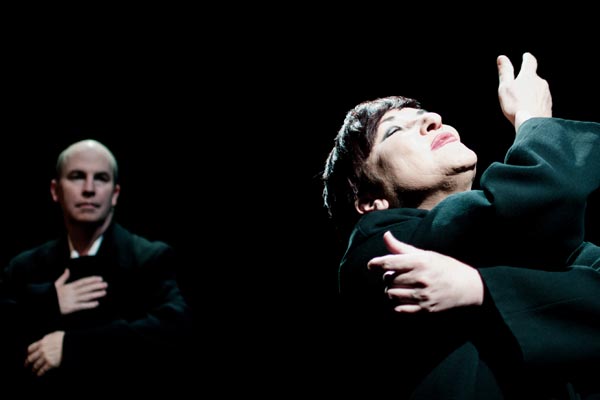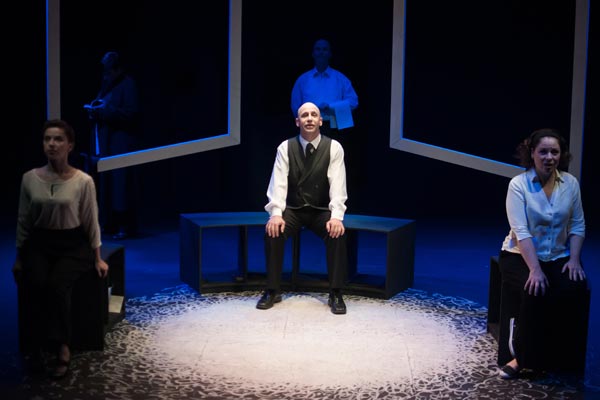“Women can be, and so often are, written out of history,” says Brisbane-based playwright Katherine Lyall-Watson. “The men are the famous ones and the women just disappear.”
This is not the case for Lydia ‘Nell’ Tritton and Nina Berberova. Nell, the Brisbane socialite and wife of a former prime minister of Russia, has a story that's definitely still alive and kicking.
While Nell died in 1946 and left no descendants, Katherine’s extraordinarily well-researched award-winning play 'Motherland' tells the story of Nell and Nina, and their astonishing lives interwoven across continents and decades. Conveying their story is Alyona, a Russian curator whose dreams of a new Australian paradise are crushed by bankruptcy and the Fitzgerald Inquiry.
 Katherine says researching the history of the two women was a ‘fascinating process’. “It began about… seven years ago. A Russian researcher… came out to live in Australia and she said she had an idea for a play, and it was based on the real story of a Brisbane woman who married the exiled Russian Prime minister and saved him from the Nazi’s in WW2. And I just went ‘no way that cannot have happened!’
Katherine says researching the history of the two women was a ‘fascinating process’. “It began about… seven years ago. A Russian researcher… came out to live in Australia and she said she had an idea for a play, and it was based on the real story of a Brisbane woman who married the exiled Russian Prime minister and saved him from the Nazi’s in WW2. And I just went ‘no way that cannot have happened!’“I started looking into it and thought it was such an incredible story… and it ended up that I was researching three women. One of them was alive and present and [was] able to talk to me, and the other two were dead and required a huge amount of digging to try and find things about their life.
 Katherine Lyall-Watson
Katherine Lyall-Watson“Nina was a writer [and] close friends with Nell… [She] had left a great legacy of work behind her, not just books on other people, but she also wrote her own autobiography, which was over 600 pages long and full of fabulous information about her friendship with Nell, which was great. She also left all her letters and scribbles and her research material in archives in America, so there was a rich ground of stuff to find about her.”
Nina’s deathbed dialogues shared many intimate details about her life with Nell. “She wrote them at the end of her life in her 90s (she died in 1993), and they were… personal, and in them she talked about being bisexual and her love for women, which she'd never admitted in anything else. So it had been something I'd picked up through the tone of the way she wrote about Nell, but it was never stated. And so once I knew that, an elderly woman, [who’d] previously battled with her sexuality and… at the end of her life [had] finally came to terms with it and quite proudly… for me was really beautiful.
“It was something I wanted in the play, so [it] ended up having this incredible journey mostly seen through Nina's memories. She goes from being an elderly woman of 92 remembering herself at 17 and at 20 and at 30, and remembering these relationships.”
However, finding information on Nell’s life wasn’t an easy feat. “There was practically nothing. Her husband [Alexander] Kerensky wrote many autobiographies and memoirs, but he never mentioned her in them. Everything he wrote was quite focused on his time in power, and his fall out of power, and he was just totally obsessed with that one period.
{youtube}OEEwRqwunMQ{/youtube}
“It became a bit of a mission to just try and salvage Nell and bring her back. And then the more I read Nina's writing about her, the surer I became that Nina's relationship with Nell went beyond friendship. So I had all these ethical dilemmas about people who are no longer with us, and who can't answer any questions, and who can't speak up for themselves, and writing something that might be true and might really upset them, or it might be making wrong assumptions and you know, upset people even more. But they're dead and buried. So I really battled this myself for going in this direction of the play.”
'Motherland' is an all-consuming beast of a play, with quick changes of scenes that jump from 1932 to 1992.
“We didn't know first whether we could pull it off, but we did and it's the sort of theatre I love most. [It’s great to see] actors working in front of you, and [see] the amazingness of their craft where they can make you believe all these different things without changes of costume or props or signs or anything else.
“For me, the biggest and most exciting moment was when we had a special showing, a charity night, and a group of donors brought the show for a night to give the tickets to nurses and volunteers at the Mater Hospital.
 “We had an audience of people who mostly would never have gone to the theatre, and there was one woman in the audience – I was working as an usher and opening doors for people – who came to at the end (and she didn't know I had written it or anything)… and she was crying, and she was just ecstatic, and she just said to me ‘I was right there, I was right there with them all, I was there, every moment.’ And I just went ‘oh my goodness.’ And I just think that's what you want to do. Your life's work is trying to create something which people can feel as if they lived it as well, and experience it too. So that was magic, for me that was the best.”
“We had an audience of people who mostly would never have gone to the theatre, and there was one woman in the audience – I was working as an usher and opening doors for people – who came to at the end (and she didn't know I had written it or anything)… and she was crying, and she was just ecstatic, and she just said to me ‘I was right there, I was right there with them all, I was there, every moment.’ And I just went ‘oh my goodness.’ And I just think that's what you want to do. Your life's work is trying to create something which people can feel as if they lived it as well, and experience it too. So that was magic, for me that was the best.”With the success of 'Motherland', Katherine is looking towards the future. “[My production company wants] to reach more forgotten stories, and people who don't normally get their voices heard, so we're going to be reaching our further and go into the community to find more of those. I want to make exciting, exhilarating theatre that makes people want to go to see performances. That's my aim, and if I can find a way to make a living out of this crazy wonderful world, that would be good.”
'Motherland' performs the Bille Brown Studio 20 – 30 April and Redland Performing Arts Centre 12 May.

